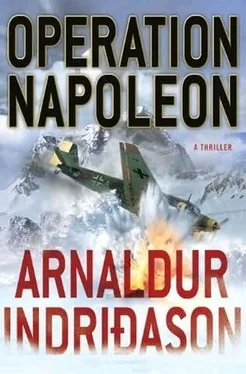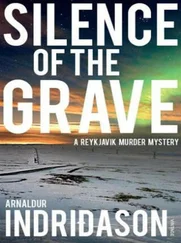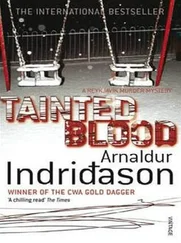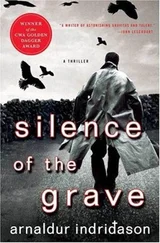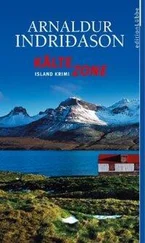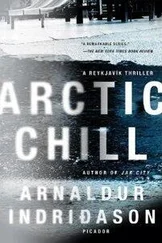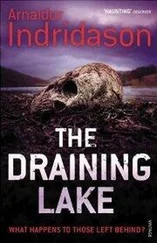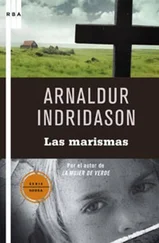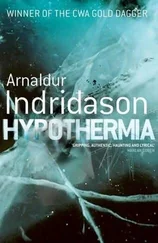‘Don’t you want our helicopters?’ the admiral asked as he stood beside Ratoff, watching the cargo being unloaded. ‘We have four new Pave Hawks in our fleet. They can move mountains.’
Ratoff was fiftyish, greying at the temples; a short, lean figure with Slavonic features and small, almost black eyes, clad in thick white cold-weather overalls and mountaineering boots. He did not so much as glance at the admiral.
‘Just provide what we need and keep your distance,’ he said curtly and walked off.
In the two days that had passed since the mark appeared on the satellite images, Carr had not been idle. The C-17 aircraft was scheduled to wait on standby at Keflavík Airport until the mission was accomplished, its huge bulk protected day and night by eight armed guards. Its passengers had included General Immanuel Wesson and a ten-man team of Delta Force operators under his command, who were deployed to Reykjavík with orders to assume control of the embassy. The ambassador and his immediate staff were sent on leave without explanation or delay.
Snow had begun to fall in heavy, wet flakes, settling in a thick blanket over the south and east of the country, and overwhelming the trucks’ windscreen wipers. There was a fair amount of traffic between Reykjavík and the small towns of Hveragerdi and Selfoss, but after that the road east was clear. The vehicles maintained a steady distance from one another as they drove through the impenetrable murk and falling snow, past the villages of Hella and Hvolsvöllur in their flat farmlands, to Vík í M¥yrdal, huddled at the foot of its glacier, and on east past the settlement of Kirkjubaejarklaustur and over the bridges of the Skeidará sands, a vast outwash plain crossed by glacial rivers that were subject at times to devastating flash floods caused by eruptions under the inland ice cap. To their left, hidden by darkness, were mountains, glaciers and the barren interior; to their right, beyond the sands, lay the harbourless coastline of the Atlantic.
Nobody noticed them. Freight transport was common in the countryside where, in the absence of railways, goods of all kinds were transported by road: agricultural machinery, food supplies and fuel bound for Iceland’s remote farms and villages.
Ratoff’s briefing had included a detailed account of the military operation in 1967, the second major expedition mounted to search for the plane on Vatnajökull. Forced to circumnavigate the country on rough dirt roads, heading first north, then approaching the ice cap from the east, it had been difficult, then as now, to avoid attention. In the end they had been obliged to resort to drastic measures.
Ratoff’s men travelled on under cover of darkness. In spite of the snow the roads were perfectly passable now that they had been asphalted. One by one they drove past the popular tourist destination of Skaftafell, making for Hornafjördur in the east. They passed through the lowland corridor of ÷raefi, Sudursveit and M¥yrar, between glacier and sea, then just before the town of Höfn turned left off the ring road, drove up into the farmlands at the foot of the glacier and stopped at the brothers’ farm. By the time Ratoff’s truck arrived, the soldiers were busy unloading the other transporters and the first snowmobiles were already on their way up to the ice cap.
The farmer stood at his door, watching the troops at work. He had seen it all before and though he did not know Ratoff, who now came walking towards him through the thickly falling snow, he had met others of his type. The farmer’s name was Jón. He had lived alone on the farm since his brother’s death several years earlier.
‘Having another crack at the glacier?’ he asked in Icelandic, shaking Ratoff’s hand. Jón knew a smattering of English – he understood it better than he could speak it – but they still had need of the interpreter supplied by the base, a man who had been stationed in Iceland for several years.
Ratoff smiled at Jón. They kicked off the snow, went inside the warm, tidy house and sat down in the sitting room, Ratoff in his white overalls, the interpreter bundled up in a down jacket, and the farmer in a red-checked shirt, worn jeans and woollen socks. He was nearly eighty, his cranium completely bald, his face a mass of wrinkles, but he was still spry and straight-backed, still mentally and physically robust. Once the men had taken their seats he offered them strong black coffee and a pinch of snuff taken from the back of his wrist. Unsure what it was, Ratoff and the interpreter shook their heads.
To Jón’s knowledge it was the third time the army had mounted an expedition to the glacier, if you counted Miller’s attempt at the end of the war. For some time afterwards, though, the colonel had returned every few years on his own, staying with the brothers for two to three weeks at a time while he scoured the ice cap with a small metal detector, before heading back to the States. He and the brothers were on friendly terms, but when they asked members of the 1967 expedition for news of Miller, they were informed that he was dead. That was the biggest expedition Jón had seen to date. As before, the brothers had acted as guides for the army, leading the soldiers up through the foothills and on to the ice sheet. They learnt that part of the wrecked aircraft had appeared on a satellite image – the military had stopped using spy planes by then. Over the years the brothers had sometimes been aware of the surveillance flights, but patrols of the area had ceased abruptly after the advent of the new technology.
The brothers had often asked themselves why the Americans were so obsessed with the German aircraft that they had the glacier monitored from space and turned up at the farm in force whenever they believed the wreckage was emerging from the ice. They had given Colonel Miller their word that they would never reveal the true purpose of the expeditions to their neighbours or anyone else; he had told them to dismiss the activity as military training exercises if the locals became curious, and they followed his advice. In private, however, they speculated endlessly, considering ever more wildly improbable theories: perhaps the plane was full of Jewish gold, or diamonds, or art treasures plundered by the Nazis from all over Europe. Perhaps there had been a high-ranking general on board, or a secret weapon from the war. Whatever it was, the US army was extremely keen both to lay hands on it and to do so without drawing attention to the fact. Every time a black mark appeared on their images of the glacier, the military authorities became very jittery indeed. It amused the old man.
‘What did you see this time?’ Jón asked, watching the interpreter relay his question to Ratoff.
‘We believe we’ve finally located it,’ the interpreter said, translating Ratoff’s words. ‘Better satellites.’
‘Yes, better satellites,’ Jón repeated. ‘Do you know what the plane contains? What it is that your people are so desperate to find?’
‘No idea,’ Ratoff replied. ‘My job is merely to accomplish a specific task. It’s nothing to do with me what the plane contains or where it comes from. My only concern is to follow my orders to the letter.’
Jón inspected Ratoff, sensing that he was a very different customer from the gentle Miller; there was something unclean, cunning even, about his expression; a hint of impatience, of an incalculable temper lurking beneath his outwardly calm demeanour.
‘Well, I wouldn’t be surprised if you found it,’ Jón went on. ‘There’s been a warm spell since about 1960 and much of the ice in this area has melted.’
‘According to our images, the nose is visible above the ice,’ Ratoff told him. ‘We have the coordinates. It shouldn’t take us long.’
‘So you know where you’re going,’ Jón said, taking a powerful sniff of the coarse tobacco. The snuff induced an overwhelming urge to sneeze in the uninitiated and was dismissed as a dirty habit by many, but the nicotine hit was every bit as strong as that from a cigarette.
Читать дальше
